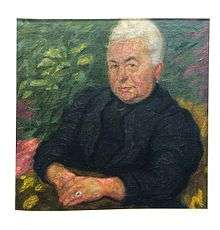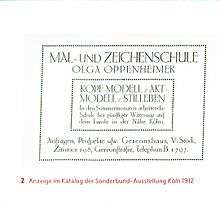Olga Oppenheimer
Olga Oppenheimer (9 July 1886 – 4 July 1941) was a German Expressionist artist.
Education
Oppenheimer trained under Paul Serusier in Paris in 1909. Thereafter, she trained in private studios in Munich and Dachau. Oppenheimer's father encouraged her pursuit of art and provided her with a studio, which was called the Gereonshaus, in his office building.[1]
Career
Oppenheimer was a co-founder of Gereonsklub, a school and major venue modern art in Cologne, Germany, in 1911. The Gereonsklub became a center of contemporary avant-garde art in the Rhineland, presenting Der Blaue Reiter, Franz Marc, Paul Klee, Robert Delaunay and others for the first time in Cologne.[2] Oppenheimer's artistic career was brief, spanning the years 1907 to 1916. Only 10 of her works survive, five of which are illustrations.[3]

Her work was exhibited in the International Sonderbund in Cologne in 1912 along with the work of two other women artists, Marie Laurencin and Paula Modersohn-Becker. The next year, in 1913, she participated in an exhibition of Rhenish Expressionists at Walter Cohen's Bookstore, put together by August Macke, an influential Expressionist painter himself.[1]

Oppenheimer was the only female German artist who participated in the Armory Show, which opened in New York City in 1913 and traveled to Boston and Chicago. She contributed a series of six woodcuts entitled Van Zanten's Happy Time, which was displayed in the same gallery as prints by Edward Munch. After 1916, her health began to decline, and she was committed to a sanatorium in 1918.[4]
Her career was interrupted by severe depression. In 1918, she entered the Waltbreitbach Sanatorium, a psychiatric institution where she spent twenty years of her life. Oppenheimer was deported in 1941 to Lublin concentration camp, Poland and died of typhus at the camp on 4 July 1941.[5]
Personal life
In 1913, Oppenheimer married Adolf Worringer, the brother of her friend Emily Worringer. They had two sons and would later divorce.[2]
References
- 1 2 Behr, Shulamith (1996). "Jewish women and Expressionism: artists, patrons and dealers". Issues in Architecture, Art & Design. 5 (1).
- 1 2 Shircliff, Jennifer Pfeifer (May 2014). Women of the 1913 Armory Show: Their Contributions to the Development of American Modern Art (dissertation). University of Louisville. Retrieved 7 March 2015.
- ↑ Glaze, Delia (1997). "Olga Oppenheimer" in'Dictionary of Women Artists Volume 2. pp. 1048-1049 ISBN 1884964214
- ↑ Glaze, Delia (1997). "Olga Oppenheimer" in'Dictionary of Women Artists Volume 2. pp. 1048-1049 ISBN 1884964214
- ↑ Glaze, Delia (1997). "Olga Oppenheimer" in'Dictionary of Women Artists Volume 2. pp. 1048-1049 ISBN 1884964214